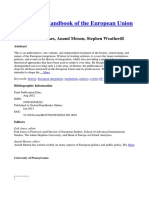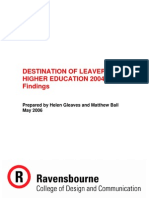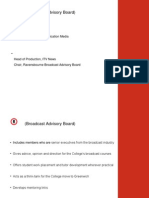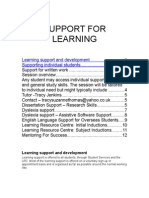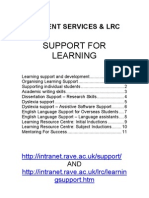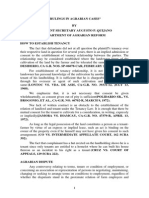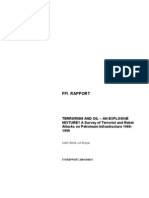Unit Title Unit Code Programme Credits Level Unit Status Contact Time Independent Study
Unit Title Unit Code Programme Credits Level Unit Status Contact Time Independent Study
Uploaded by
lisaconnollyCopyright:
Available Formats
Unit Title Unit Code Programme Credits Level Unit Status Contact Time Independent Study
Unit Title Unit Code Programme Credits Level Unit Status Contact Time Independent Study
Uploaded by
lisaconnollyOriginal Title
Copyright
Available Formats
Share this document
Did you find this document useful?
Is this content inappropriate?
Copyright:
Available Formats
Unit Title Unit Code Programme Credits Level Unit Status Contact Time Independent Study
Unit Title Unit Code Programme Credits Level Unit Status Contact Time Independent Study
Uploaded by
lisaconnollyCopyright:
Available Formats
Section 3
Unit Title Management and Organisations
Unit Code BRD201
Programme BA (Hons) Broadcasting (Sound Design, Post Production,
Production)
Credits 10 Level 2 Unit Status Mandatory Core
Contact Time 14 Access to Resources 2 Independent Study 84
Broadcasting companies must serve their customers – the audience
– and operate effectively in a commercial marketplace. This module
introduces students to the business skills needed to understand that
market as well as how organisations work both structurally and
culturally.
Introduction
Students will undertake a challenging project to investigate how an
organisation of their choice has developed its particular ‘personality’.
Since this involves understanding strategic and marketing issues, it
is a useful way to incorporate understanding of business processes
in parallel with broadcasting culture.
Themes covered in the unit will include:
• Organisation and cultures of media companies;
• Individual and group responsibilities within media
Indicative corporations;
Curriculum
• The evolution of the broadcasting business in the UK;
Outline
• The metamorphosis of the media industry from cartel to the
multi channel marketplace;
• The impact of multi media on the organisation of the creative
industries.
Faculty of Communication Media Definitive Document: 21 July 2006
Section 3
This unit explores broadcasting’s commercial framework and
students are expected to make the most of this opportunity to
position themselves in preparation for their entry into the industry.
Knowledge and Understanding
By the end of this unit, the learner should demonstrate knowledge
and understanding of the following:
1. How organisations work (structure, culture, operations,
management, employment protocols, job descriptions, briefs
and specifications); (LO1)
2. The centrality of the customer/audience in business and the
need to understand their needs through appropriate research;
Unit Learning
(LO2)
Outcomes
3. The role of strategic planning for business; (LO3)
4. The marketing planning and execution process. (LO4)
Skills
Learners must also demonstrate through assessed work their ability
to:
5. Select and plan an appropriate research project; (LO5)
6. Carry out effective individual investigation and present their
findings in a coherent and verifiable report; (LO6)
7. Understand team dynamics and work within team
frameworks; (LO7)
8. Effectively position themselves in the marketplace. (LO8)
This unit is designed to introduce the student to effective research,
evaluation, presentation and written communication. Central to the
unit is the focus on commercial application. It will make use of the
following:
Teaching and
Learning • Lectures – held throughout the Level 2 bridging programme;
Strategies • Group work – to include team working exercises;
• Self-directed study – students are expected to carry out
independent study and present findings;
• Written work – written report, indexed Project File and
personal CV.
Faculty of Communication Media Definitive Document: 21 July 2006
Section 3
Formative Assessment
The following are intended to provide indicative feedback and do not
form part of the final grade:
• Personal CV;
• SWOT analysis presentation.
Summative Assessment
The following elements will be assessable and will contribute to the
Assessable final grade for the unit.
Elements
• 1000 word Management Study Report;
• Project File with contents;
• Contribution to group feedback.
Assessable Elements Percentage of Final Grade
1000 word Management Study 40%
Report
Project File with contents 40%
Contribution to group feedback 20%
Faculty of Communication Media Definitive Document: 21 July 2006
Section 3
Learners are judged to have achieved this unit when they have:
Demonstrated via their Project File knowledge and understanding of:
• The production cycle and the component parts of broadcasting
business; (LO1)
• Knowledge of how organisations work. (LO1)
Demonstrated in their Management Study Report:
• Effective planning and execution of a research project; (LO5,
LO6)
Assessment • Drawing on different aspects of business to investigate an
Criteria organisation. (LO6)
Shown through any of the assessable elements an understanding of:
• The centrality of the customer/audience and need for
appropriate research; (LO2)
• The role of strategic planning for business; (LO3)
• The planning and execution of marketing. (LO4)
Completed a personal skills and presentation audit through:
• Participation in team exercises; (LO7)
• The generation of a CV. (LO8)
Handy, C. (1986) Understanding Organizations, Penguin Books.
Tinker, J. (1980) The Television Barons, Panther Modern
Publications.
Indicative
Reading List
Leer, A. (1999) Masters Of The Wired World, FT Pitman.
Slywotzky, A. and Morrison, D. (2000) How Digital Is Your Business?
Nicholas Brealey.
Faculty of Communication Media Definitive Document: 21 July 2006
You might also like
- CPTC Study GuideDocument25 pagesCPTC Study GuidetinysamNo ratings yet
- Creative Encounter With God in Worship - A Critical Reflection On Howard ThurmanDocument12 pagesCreative Encounter With God in Worship - A Critical Reflection On Howard ThurmanRev. Alcenir Oliveira, MDiv, MBA, BBA & BPANo ratings yet
- Jones Erik, Menon Anand, Weatherill Stephen. - The Oxford Handbook of The European UnionDocument844 pagesJones Erik, Menon Anand, Weatherill Stephen. - The Oxford Handbook of The European UnionCaren Cubides100% (1)
- Municipal Accounting 2Document26 pagesMunicipal Accounting 2Marius BuysNo ratings yet
- MKTG 201 - Principles of Marketing - Rohail AshrafDocument8 pagesMKTG 201 - Principles of Marketing - Rohail AshrafQasim FarooqNo ratings yet
- Marketing Research Planning PDFDocument7 pagesMarketing Research Planning PDFShubham KanodiaNo ratings yet
- FCE Use of English - Part 4 PDFDocument187 pagesFCE Use of English - Part 4 PDFAnonymous twG6wwT100% (1)
- Presentation On RecruitmentDocument15 pagesPresentation On Recruitmentsudheer2011100% (4)
- PM - Course Outline 2016-2017-StudentDocument8 pagesPM - Course Outline 2016-2017-StudentQasim FarooqNo ratings yet
- Unit Title Unit Code Programme Credits Level Unit Status Contact Time Independent StudyDocument5 pagesUnit Title Unit Code Programme Credits Level Unit Status Contact Time Independent StudylisaconnollyNo ratings yet
- BUS2205 - MM Course Outline - T3 2021-22 L1Document7 pagesBUS2205 - MM Course Outline - T3 2021-22 L1JOANNA LAMNo ratings yet
- SADMA Outline (2009-11)Document3 pagesSADMA Outline (2009-11)nkmpatnaNo ratings yet
- Unit Descriptions 4 YrDocument13 pagesUnit Descriptions 4 YrniyitangamahorosamuellNo ratings yet
- Course Outline Fundamentals of MarketingDocument10 pagesCourse Outline Fundamentals of MarketingAnsab ArfanNo ratings yet
- In Partnership With The University of Suffolk MBA AssignmentDocument11 pagesIn Partnership With The University of Suffolk MBA AssignmentyehashaNo ratings yet
- MKT509 - Online Branding & Reputation ManagementDocument13 pagesMKT509 - Online Branding & Reputation Managementsurbhi guptaNo ratings yet
- T1 - CO - MM-I - Batch 2022-24Document14 pagesT1 - CO - MM-I - Batch 2022-24Mr. Shahil Kumar Student, Jaipuria LucknowNo ratings yet
- In Partnership With The University of Suffolk MBA AssignmentDocument11 pagesIn Partnership With The University of Suffolk MBA AssignmentmiaNo ratings yet
- Scheme of Work Mkt646Document5 pagesScheme of Work Mkt646Micheal PruittNo ratings yet
- Strategy Implementation - Course Outline - TentativeDocument6 pagesStrategy Implementation - Course Outline - TentativeParth Hemant PurandareNo ratings yet
- 0 0 - MKT4930 - Advanced Theory and Issues in Outdoor AdvertisingDocument10 pages0 0 - MKT4930 - Advanced Theory and Issues in Outdoor AdvertisingDiamond MC TaiNo ratings yet
- BMP5005 Module GuideDocument15 pagesBMP5005 Module GuideShawn MatNo ratings yet
- RPS Manajemen Pemasaran Stratejik OKDocument13 pagesRPS Manajemen Pemasaran Stratejik OKsahronoNo ratings yet
- MKTG 201-Principles of Marketing-Khudejah Iqbal AliDocument7 pagesMKTG 201-Principles of Marketing-Khudejah Iqbal AliEasy PeasyNo ratings yet
- Cptcstudyguide FoundationDocument25 pagesCptcstudyguide FoundationDavidNo ratings yet
- Industry and Competitive Landscape Analysis - Course OutlineDocument11 pagesIndustry and Competitive Landscape Analysis - Course OutlineSoundara VishalNo ratings yet
- BCC600 - International Financial Reporting and AnalysisDocument4 pagesBCC600 - International Financial Reporting and AnalysisHaritha SasankaNo ratings yet
- Project - E-Business - BBAD2006 - Dr. Vidya Dayinee SharanDocument12 pagesProject - E-Business - BBAD2006 - Dr. Vidya Dayinee SharanManan AswalNo ratings yet
- ENGR301 - Lecture 09Document36 pagesENGR301 - Lecture 09N MNo ratings yet
- 2024 - Fall - Career Development-Project Guidelines - UpdatedDocument4 pages2024 - Fall - Career Development-Project Guidelines - UpdatedlekhanhseaweedNo ratings yet
- Marketing Management Course OutlineDocument8 pagesMarketing Management Course OutlineSwapnil JoardarNo ratings yet
- Course Outline Strategic Management - Summer MAN612Document5 pagesCourse Outline Strategic Management - Summer MAN612Rafique ArisarNo ratings yet
- Retail Management Handout-2020-21 BatchDocument7 pagesRetail Management Handout-2020-21 BatchShaan RoyNo ratings yet
- IIBM Summer Internship Project - FormatDocument20 pagesIIBM Summer Internship Project - FormatAmruta MuradeNo ratings yet
- Product Policy and Brand Management - Joshy JosephDocument3 pagesProduct Policy and Brand Management - Joshy JosephPulokesh GhoshNo ratings yet
- Course Specification-MKTG-2401 - MSHDocument5 pagesCourse Specification-MKTG-2401 - MSHAbrar Alam ChowdhuryNo ratings yet
- Ok - Elect 304 Services MarketingDocument20 pagesOk - Elect 304 Services Marketingchristian duranNo ratings yet
- Unit Information Form (UIF)Document10 pagesUnit Information Form (UIF)Naresh Ramratan0% (1)
- Course Guide: AGU 644 International Marketing Management Graduate School of Business Universiti Sains MalaysiaDocument9 pagesCourse Guide: AGU 644 International Marketing Management Graduate School of Business Universiti Sains Malaysiahamza50No ratings yet
- Unit Information Form (UIF)Document7 pagesUnit Information Form (UIF)Tho HuuNo ratings yet
- BM 1 Strategic Management SYLLABUSDocument13 pagesBM 1 Strategic Management SYLLABUSMagbanua, Jamaica S.No ratings yet
- Guidelines MBA Internship Field Project MBA III (2022-24)Document25 pagesGuidelines MBA Internship Field Project MBA III (2022-24)Pragya GoswamiNo ratings yet
- Format 1Document18 pagesFormat 1529 NeerajNo ratings yet
- LecturePlan MB302 23BBT-602Document6 pagesLecturePlan MB302 23BBT-602ananttyagi089No ratings yet
- Week02 Project Charter Slides EODocument20 pagesWeek02 Project Charter Slides EOLucas WangNo ratings yet
- EHLM-01 Advanced Corporate CommunicationDocument4 pagesEHLM-01 Advanced Corporate CommunicationAbirami Narayanan100% (1)
- Syllabus Strategic Management - Semester GENAP 2022 2023Document11 pagesSyllabus Strategic Management - Semester GENAP 2022 2023Aaron jonathanNo ratings yet
- PROJECT ANALYSIS & EVALUATION Distance Material - Wolo UniversityDocument128 pagesPROJECT ANALYSIS & EVALUATION Distance Material - Wolo UniversityTemesgenNo ratings yet
- International Business Management MSc-2Document17 pagesInternational Business Management MSc-2Leonard Clay AidooNo ratings yet
- Lahore University of Management Sciences MKTG 222 - Retail ManagementDocument5 pagesLahore University of Management Sciences MKTG 222 - Retail ManagementShan Ali ShahNo ratings yet
- Cource Outline Marketing ManagementDocument12 pagesCource Outline Marketing ManagementABHISHEK CHHETRI Jaipuria JaipurNo ratings yet
- International MarketingDocument4 pagesInternational MarketingatingmaleNo ratings yet
- 23-UoS BABS L4 Term 1 MM Assignment April-July 2020 For April 2019 IntakeDocument14 pages23-UoS BABS L4 Term 1 MM Assignment April-July 2020 For April 2019 IntakePalak ShahNo ratings yet
- CW Assessment 1 Project ProposalDocument8 pagesCW Assessment 1 Project Proposalsalmankhalid0011No ratings yet
- General Management Programme: Enhance Your Managerial EffectivenessDocument19 pagesGeneral Management Programme: Enhance Your Managerial Effectivenessashy1985No ratings yet
- Business Strategy: Program ObjectivesDocument6 pagesBusiness Strategy: Program ObjectivesRaja TajamalNo ratings yet
- Syllabus Format - Straman (Finance)Document4 pagesSyllabus Format - Straman (Finance)maria arandaNo ratings yet
- MKTG 201-Principles of Marketing-Sarah Suneel SarfrazDocument6 pagesMKTG 201-Principles of Marketing-Sarah Suneel Sarfrazhaiders youtubeNo ratings yet
- ProjecttitalDocument13 pagesProjecttitalsanakalpa avtNo ratings yet
- Course Outline - Investment Management - IIM Ranchi - 2018Document7 pagesCourse Outline - Investment Management - IIM Ranchi - 2018Ankit BhardwajNo ratings yet
- PM Nano DegreeDocument16 pagesPM Nano DegreesumitarjunNo ratings yet
- Course Outline MMIDocument9 pagesCourse Outline MMIManish KumarNo ratings yet
- Group Project Software Management: A Guide for University Students and InstructorsFrom EverandGroup Project Software Management: A Guide for University Students and InstructorsNo ratings yet
- Researching the Value of Project ManagementFrom EverandResearching the Value of Project ManagementRating: 2.5 out of 5 stars2.5/5 (4)
- Unit Title Unit Code Programme Credits Level Unit Status Contact Time Independent StudyDocument5 pagesUnit Title Unit Code Programme Credits Level Unit Status Contact Time Independent StudylisaconnollyNo ratings yet
- Add Recipient Name and AddressDocument1 pageAdd Recipient Name and AddresslisaconnollyNo ratings yet
- A New Brand For Ravensbourne: Michael Johnson, Johnson Banks March 2010Document75 pagesA New Brand For Ravensbourne: Michael Johnson, Johnson Banks March 2010lisaconnollyNo ratings yet
- Documentary Budget FormatDocument40 pagesDocumentary Budget Formatlisaconnolly90% (10)
- Annual Enterprise and Employability Report 2005/06: Prepared by Helen GleavesDocument12 pagesAnnual Enterprise and Employability Report 2005/06: Prepared by Helen GleaveslisaconnollyNo ratings yet
- Academic Regulations: Welcome To RavensbourneDocument22 pagesAcademic Regulations: Welcome To RavensbournelisaconnollyNo ratings yet
- Ravensbourne College of Design and Communication: Financial Strategy 2005-2012Document16 pagesRavensbourne College of Design and Communication: Financial Strategy 2005-2012lisaconnollyNo ratings yet
- A New Brand For Ravensbourne: Michael Johnson, Johnson Banks March 2010Document75 pagesA New Brand For Ravensbourne: Michael Johnson, Johnson Banks March 2010lisaconnollyNo ratings yet
- DesignforInteraction07 08Document139 pagesDesignforInteraction07 08lisaconnollyNo ratings yet
- Part 1 - Formal BusinessDocument4 pagesPart 1 - Formal BusinesslisaconnollyNo ratings yet
- ACT107Document1 pageACT107lisaconnollyNo ratings yet
- PBS080602 Minutes260208Document3 pagesPBS080602 Minutes260208lisaconnollyNo ratings yet
- Annual Enterprise and Employability Report 2004/05: Prepared by Helen GleavesDocument18 pagesAnnual Enterprise and Employability Report 2004/05: Prepared by Helen Gleaveslisaconnolly100% (1)
- Arrangements For Health & Safety: Page 1 of 20Document20 pagesArrangements For Health & Safety: Page 1 of 20lisaconnollyNo ratings yet
- Destination of Leavers From Higher Education 2004/05 FindingsDocument32 pagesDestination of Leavers From Higher Education 2004/05 FindingslisaconnollyNo ratings yet
- Ravensbourne College of Design and CommunicationDocument28 pagesRavensbourne College of Design and CommunicationlisaconnollyNo ratings yet
- FCCM080201 Agenda050308Document2 pagesFCCM080201 Agenda050308lisaconnollyNo ratings yet
- LTR080307-Learning Enhancement Stategy-DraftDocument3 pagesLTR080307-Learning Enhancement Stategy-DraftlisaconnollyNo ratings yet
- (Broadcast Advisory Board) BAB ROA Awards: - Barbara Howell Head of Faculty, Communication MediaDocument7 pages(Broadcast Advisory Board) BAB ROA Awards: - Barbara Howell Head of Faculty, Communication MedialisaconnollyNo ratings yet
- Supportfor LearningbrochureDocument12 pagesSupportfor LearningbrochurelisaconnollyNo ratings yet
- ReleasingmarksguidanceDocument2 pagesReleasingmarksguidancelisaconnollyNo ratings yet
- Student WelbeingwebsiteDocument2 pagesStudent WelbeingwebsitelisaconnollyNo ratings yet
- Support For Learning: Student Services & LRCDocument11 pagesSupport For Learning: Student Services & LRClisaconnollyNo ratings yet
- "Rewarding Performance, Recognising Achievement": Ravensbourne College of Design and CommunicationDocument6 pages"Rewarding Performance, Recognising Achievement": Ravensbourne College of Design and CommunicationlisaconnollyNo ratings yet
- Number Sub-Objective Target Action Accountability ResourcesDocument30 pagesNumber Sub-Objective Target Action Accountability ResourceslisaconnollyNo ratings yet
- "Rewarding Performance, Recognising Achievement": Ravensbourne College of Design and CommunicationDocument6 pages"Rewarding Performance, Recognising Achievement": Ravensbourne College of Design and CommunicationlisaconnollyNo ratings yet
- Ravensbourne College of Design & Communication Job Evaluation ProcessDocument4 pagesRavensbourne College of Design & Communication Job Evaluation ProcesslisaconnollyNo ratings yet
- Ravensbourne: College of Design and Communication Strategic Plan 2008 2013Document22 pagesRavensbourne: College of Design and Communication Strategic Plan 2008 2013lisaconnollyNo ratings yet
- "Rewarding Performance, Recognising Achievement": Ravensbourne College of Design and CommunicationDocument6 pages"Rewarding Performance, Recognising Achievement": Ravensbourne College of Design and CommunicationlisaconnollyNo ratings yet
- Review of Support and Academic Staff Pay and ImplementationDocument3 pagesReview of Support and Academic Staff Pay and ImplementationlisaconnollyNo ratings yet
- Clasa 4abDocument4 pagesClasa 4abAlina JitariuNo ratings yet
- About Sharpen Your MindDocument3 pagesAbout Sharpen Your MindhildajhwdNo ratings yet
- RS1138 - Education For Rural Development in Seti ZoneDocument92 pagesRS1138 - Education For Rural Development in Seti ZoneTirtharaj DhunganaNo ratings yet
- Best of Kenya Vol 1Document186 pagesBest of Kenya Vol 1sven100% (2)
- Microwave Journal-July 2021Document100 pagesMicrowave Journal-July 2021Petros TsenesNo ratings yet
- Rulings in Agrarian CasesDocument105 pagesRulings in Agrarian CasesjelyneptNo ratings yet
- Definition and Basics of Media Writing ConceptDocument16 pagesDefinition and Basics of Media Writing ConceptClay MarquezNo ratings yet
- Kautilya: A Political Thought ScrutinyDocument14 pagesKautilya: A Political Thought ScrutinyKajal SinghNo ratings yet
- Agenția Națională Pentru Curriculum Și Evaluare: Ministerul Educației, Culturii Și Cercetării Al Republicii MoldovaDocument6 pagesAgenția Națională Pentru Curriculum Și Evaluare: Ministerul Educației, Culturii Și Cercetării Al Republicii MoldovaAnastasia ColesnicNo ratings yet
- Building Permit Requirement Checklist To Do ListDocument1 pageBuilding Permit Requirement Checklist To Do ListAndrea Mae Sanchez0% (1)
- Chapter 2 - Language Choice in Multilingual CommunitiesDocument21 pagesChapter 2 - Language Choice in Multilingual CommunitiesGuadalupe0% (1)
- Branch BankingDocument12 pagesBranch BankingPRIYANSH BHARGAVANo ratings yet
- JSA Install Automatic Parking GateDocument6 pagesJSA Install Automatic Parking GateMarhendraNo ratings yet
- Preparatoria Abierta: Inglés IIIDocument5 pagesPreparatoria Abierta: Inglés IIIRAUL DE JESUS DURANNo ratings yet
- 1907 The Hague Convention For The Pacific Settlement of International Disputes 1Document19 pages1907 The Hague Convention For The Pacific Settlement of International Disputes 1Mary Louis SeñoresNo ratings yet
- Department of Education: Insights/Key Take Away/Learning Clarifications/ QuestionsDocument6 pagesDepartment of Education: Insights/Key Take Away/Learning Clarifications/ Questionsnoel bandaNo ratings yet
- Second PeerDocument1 pageSecond Peerapi-316910625No ratings yet
- Practical Research 1: Quarter 4 Week 2-4 Lesson 13: Sampling Procedure and SampleDocument2 pagesPractical Research 1: Quarter 4 Week 2-4 Lesson 13: Sampling Procedure and SampleNiko ChavezNo ratings yet
- Quality System Procedure: Introduction:-ResponsibilityDocument3 pagesQuality System Procedure: Introduction:-ResponsibilityPeracha EngineeringNo ratings yet
- Rylee Pohlkamp - The Circle - Privacy Themes AnalysisDocument2 pagesRylee Pohlkamp - The Circle - Privacy Themes Analysisapi-572400543No ratings yet
- A Survey of Terrorist and Rebel Attacks On Petroleum InfrastructureDocument51 pagesA Survey of Terrorist and Rebel Attacks On Petroleum InfrastructureOla WamNo ratings yet
- Level 11 Passage 4Document5 pagesLevel 11 Passage 4Micheal Chien0% (1)
- Customer Serivce Seller Support - SOPDocument9 pagesCustomer Serivce Seller Support - SOPsiddheshNo ratings yet
- Investigating The Learning Action Cell (Lac) Experiences of Science Teachers in Secondary Schools: A Multiple Case StudyDocument8 pagesInvestigating The Learning Action Cell (Lac) Experiences of Science Teachers in Secondary Schools: A Multiple Case StudyIOER International Multidisciplinary Research Journal ( IIMRJ)100% (1)
- Deep Learning and Computer Vision For Video AnalyticsDocument37 pagesDeep Learning and Computer Vision For Video AnalyticsPal SambitNo ratings yet
- Metacognitive Reading Report # 1: General InstructionsDocument2 pagesMetacognitive Reading Report # 1: General InstructionsSeth Jarl G. AgustinNo ratings yet


